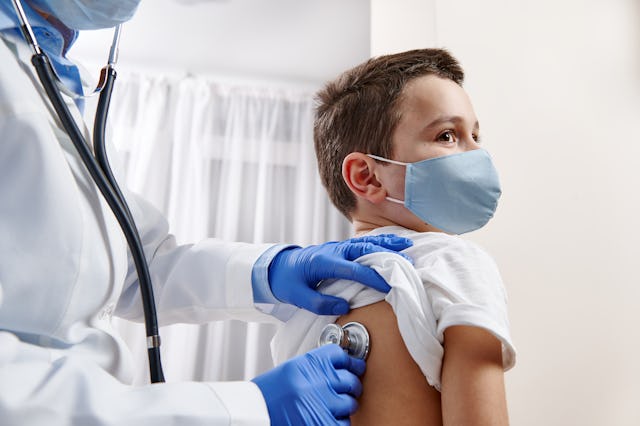Can Kids Get Monkeypox? What Parents Should Know About The Viral Disease
Don’t panic — but do stay vigilant.

Coming off this grueling pandemic (But are we though? Is it really over?), the last word anyone wants to hear is "outbreak." And yet here we are, noting new headlines with increasing alarm and confusion: What the hell is monkeypox, and exactly how worried about it are we supposed to be? What started as a small spate of cases has grown to 584 confirmed cases in 26 countries as of May 31. According to the Centers for Disease Control and Prevention, that includes 18 cases recorded across eight states in the U.S. so far.
But before you revive your sourdough starter, yank your kid from school, and brace for lockdown, take a look at our heartening Q&A with Dr. Jennifer Trachtenberg, a pediatrician and parenting expert in New York City. The upshot? There's no need to freak out just yet, but it's always a good idea to keep an eye on the situation.
Everything Parents Need To Know About Monkeypox in 2022
Scary Mommy: How worried should we be about our kids contracting monkeypox?
Dr. Jennifer Trachtenberg: At this time, parents should not worry about their kids contracting monkeypox.
SM: Oh, awesome! Why is everyone talking about it, then?
JT: While monkeypox is very rare, cases have been confirmed in Europe and the United States, which is unusual. So, of course, that gets reported on. But right now, it's still much more likely for your child to contract COVID. Parents should not be alarmed, but if they have questions, they should reach out to their pediatrician.
SM: OK, but how does one contract monkeypox?
JT: Transmission of the virus occurs when a person comes into contact with an infected animal or human or with materials contaminated with the virus. It enters the body through broken skin—and bear in mind that skin can be broken without being visibly broken—or through the respiratory tract or mucous membranes (meaning your eyes, nose, or mouth). Animal-to-human transmission may occur by bite or scratch, or direct contact with body fluids, the lesions the virus causes, or the fluid that leaks from those lesions. But it can also happen through indirect contact with that lesion material, such as through contaminated bedding.
SM: Is there something we should tell our kids to do?
JT: Nothing they're not already doing to avoid COVID. According to the CDC, human-to-human transmission is thought to occur primarily through large respiratory droplets, which generally cannot travel more than a few feet. So, avoiding prolonged face-to-face contact is probably a good idea.
SM: What's the difference between chickenpox, smallpox, and monkeypox?
JT: Monkeypox and smallpox are both caused by members of the poxvirus family, but chickenpox is caused by the Varicella zoster virus and is not related to the poxviruses. However, it is related to smallpox, which is extremely contagious, serious, and potentially fatal—but has been eradicated by the smallpox vaccine. Monkeypox is similar but much milder, and the smallpox vaccine also protects against monkeypox. The diseases also progress differently: lymph node swelling before the rash occurs can be a clinical feature that distinguishes monkeypox from smallpox.
SM: So, this is sounding unlikely, but what happens if a child does get monkeypox?
JT: After a 7-to-14-day incubation period, it usually starts with a fever, headache, muscle aches, swollen glands, and exhaustion — all symptoms that are pretty similar to the flu. Typically, after a few days of the fever, the rash begins on the face, then spreads throughout the body. The rash goes through stages: flat, red marks, then elevated blisters, then the blisters scab over. There's no treatment for monkeypox, and it usually lasts 2-4 weeks until it resolves.
Editor's note: Although there isn’t currently a monkeypox vaccination, smallpox vaccines are effective against monkeypox infection, and a vaccine created to prevent both smallpox and monkeypox is available in the event of a monkeypox outbreak. For updated information on the monkeypox situation from the Centers for Disease Control and Prevention (CDC), click here.
This article was originally published on